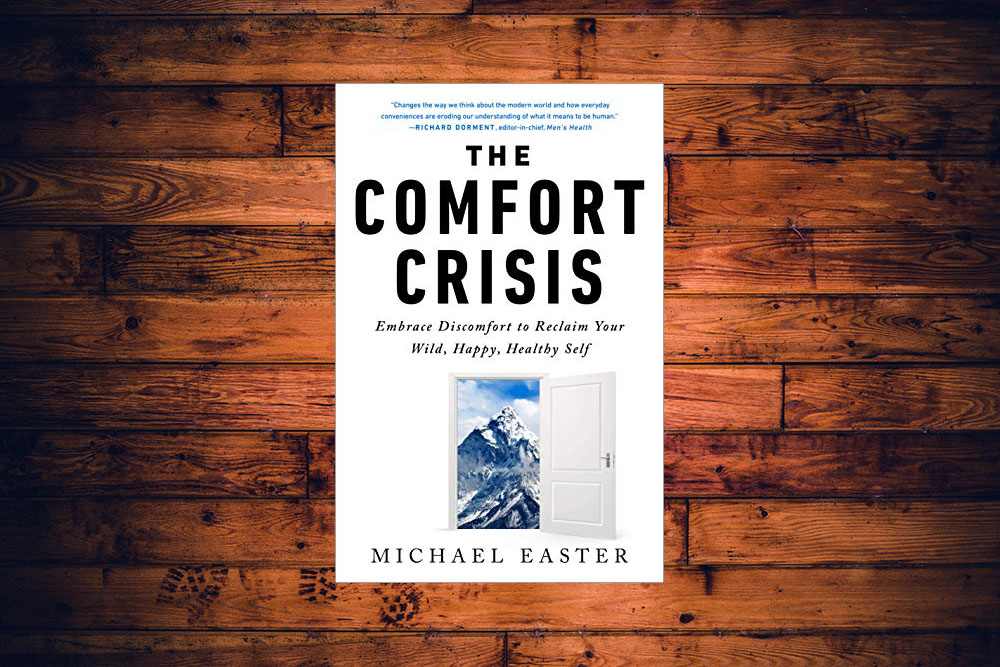
The Comfort Crisis
THE COMFORT CRISIS:
Embracing Discomfort to Reclaim Your Wild, Happy, Healthy Self
I
n today’s world, comfort has become synonymous with success and well-being. We surround ourselves with conveniences that cater to our every need, often at the expense of our physical and mental health.
Michael Easter’s book, “The Comfort Crisis,” is a compelling exploration of this phenomenon and argues that discomfort is essential for our overall health and happiness. Throughout human history, spending time in nature, taking on physical challenges, enduring hunger, and regularly facing mortality have played a fundamental role in the evolution process; however, in the last century, modern comforts have made obtaining these comforts effortless. Our modern lifestyles, characterised by excessive comfort, are deemed responsible for a wide range of issues that afflict the most industrialised parts of the world. Billions of people are confronted by a paradox defined as “evolutionary mismatch”: the rapid development of modern life has outpaced our biological adaptation, leading to various mismatches between our ancestral traits and the current environment, thus causing a clash between our instinct for seeking comfort and the modern maladies caused by comfort.
The comfort crisis manifests in various ways:
- Sedentary Lifestyle: Prolonged periods of sitting and the ubiquity of screens have led to a sedentary epidemic. This lifestyle is associated with obesity, cardiovascular diseases, and decreased overall fitness.
- Avoidance of Discomfort: The comfort-seeking mindset has led people to avoid challenging situations, resulting in personal growth and resilience stagnation.
- Mental Health Challenges: An overreliance on comfort can lead to mental health issues such as anxiety and depression. Constant avoidance of discomfort prevents individuals from developing coping mechanisms and resilience.
Several aspects of modern life modulate the extent to which the comfort crisis affects our well-being. Living in highly urbanised environments is one of the most relevant factors: urban environments, while rich in resources and mating opportunities, have removed us from the natural world, causing numerous health problems and depriving us of psychological and physical benefits.
Research supports the notion that urban living contributes to higher rates of anxiety and depression compared to rural living. However, Easter distinguishes between two types of urban dwellers: urban culturalists, who derive satisfaction from the cultural richness of urban contexts, and urban materialists, who continually seek material possessions.
The author explains how population density and noise in cities contribute to chronic mental health issues and unhappiness; city soundscapes are particularly stressful, as humans evolved in quiet natural environments. Urban noise negatively impacts children’s language learning abilities.

Easter proposes a “Comfort Remedy” – spending time in nature to counteract the detrimental effects of urban living: weekly nature breaks of at least 20 minutes, monthly excursions to rural nature for at least five hours, and yearly three-day trips to “wild” nature. These experiences in natural settings have been shown to reduce anxiety, depression, and anger while enhancing productivity and creativity… And let’s not be discouraged by poor weather, as it can provide tremendous mental health benefits (provided that the conditions remain safe): for instance, the scent of rain, known as petrichor, enhances mood when inhaled, highlighting the therapeutic effects of being exposed to the elements.
Our reluctance to challenge ourselves and discover our full potential is another way comfort holds us back; this hesitance to step out of our comfort zones is linked to psychological issues like anxiety and depression. We often remain within restrictive comfort zones due to a disproportionate fear of failure—a fear that was historically valid but is less applicable in our modern circumstances: this fear limits us from pursuing meaningful endeavours and discovering our true capabilities.
To overcome this fear of failure and expand our comfort zones, Easter introduces a “time travel” thought exercise. This exercise encourages individuals to contemplate the future consequences of their actions in order to make better decisions for their future selves. By visualising the long-term benefits of challenging oneself, individuals can mitigate the fear of failure and take meaningful risks.
After all, we inherently crave challenges that test our physical and mental capacities. Engaging in such challenges contributes to feelings of happiness, confidence, and resilience. Pushing beyond perceived limits boosts confidence because it proves that one can go further than previously believed, and individuals who have a history of struggle tend to demonstrate greater resilience when faced with new challenges. Easter emphasises that the “Comfort Remedy” lies in embarking on challenging adventures. He offers the following tips for those seeking transformational challenges:
- Difficulty without Fatality: choose challenges that are difficult but not deadly, with roughly a 50% chance of success. Failure should be acceptable, as the goal is personal growth rather than achieving a specific outcome. The consequence of failing should not be life-threatening.
- Personalised Challenges: design challenges that are tailored to your individual capabilities and interests, avoid comparing yourself to others, and focus on personal growth.
- Private Endeavours: avoid sharing your challenging adventures on social media. Sharing can shift the focus from personal perseverance to seeking attention, which can dilute the transformative nature of the challenge.
By challenging ourselves and expanding our comfort zones, we can break free from the constraints of excessive comfort and embark on transformative journeys of self-discovery and growth.
Exercise emerges as another powerful antidote in the book, with its capacity to prevent disabilities and reduce the risk of major causes of death, including heart disease and cancer. Humans are inherently built for endurance, capable of running long distances and carrying objects efficiently. Our running capabilities evolved for “endurance hunting,” allowing us to persistently chase down prey until they succumbed to heat exhaustion. This capacity sets us apart as the most proficient long-distance runners among animals.

On this subject, Easter introduces the concept of “rucking,” a form of exercise that promotes overall fitness by combining cardiovascular endurance with strength. Unlike running, which has a higher impact on the knees and a greater risk of injury, rucking strengthens core and glute muscles, supporting healthy posture and stability while preventing back pain.
The author also suggests that embracing the discomfort of hunger is a means of combating some of our modern-day problems: our evolutionary instincts make us susceptible to obesity because our ancestors capitalised on opportunities to stockpile calories as insurance against uncertain times. However, the constant availability of calorie-dense processed foods and chronic stress, leading to stress eating, exacerbates the issue.
In several sections of the book, Easter focuses on the impact of excessive comfort on our mental health and reveals a precious and often forgotten ally: boredom. Boredom, whose death is somehow controversially set to the day the first generation of iPhone appeared on the market, on 9 January 2007, is often seen as a negative state. In fact, it can enhance creativity and motivation; it puts the mind in an unfocused state that fosters openness to new ideas and can drive productivity. It also forces us to sit with our thoughts and encourages contemplation of significant subjects that are often pushed aside because they are deemed uncomfortable.
“The Comfort Crisis” presents a thought-provoking perspective on the detrimental impact of excessive comfort on our health and happiness. In our increasingly comfortable world, it is essential to recognize the importance of embracing discomfort for personal growth and well-being. Scientific research supports the idea that discomfort, when approached mindfully and intentionally, can have positive effects on physical health, mental well-being, and personal development.
To reclaim our wild, happy, and healthy selves, it is imperative to strike a balance between comfort and discomfort in our lives: embracing discomfort may be the key to unlocking our full potential.
Jessica Giuffrida
I’m Jessica Giuffrida, an avid reader and knowledge enthusiast who is always seeking new insights and perspectives. Welcome to my blog!



